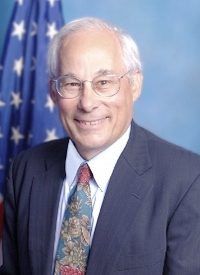
Last month, Indiana boasted being the first state to stop federal funding to Planned Parenthood by cutting off the funds it administers through Medicaid. Naturally, the move was expected to entice a number of legal challenges. Instead, however, the law has been challenged by President Obama’s Medicaid Administrator Donald Berwick (left). CNS News writes:
In a letter sent to Indiana’s Medicaid director, and obtained by The Associated Press on Wednesday, Medicaid Administrator Donald M. Berwick says Indiana’s plan will improperly bar Medicaid beneficiaries from receiving services. Berwick writes that federal law requires Medicaid beneficiaries to be able to obtain services from any provider qualified to provide services.
Berwick wrote in his letter, “Medicaid programs may not exclude qualified healthcare providers from providing services that are funded under the program because of a provider’s scope of practice.”
Signed by Indiana Governor Mitch Daniels, the law also bans abortion after 20 weeks because of fetal pain. Daniels explained of the measure:
I will sign HEA 1210 when it reaches my desk a week or so from now. I supported this bill from the outset, and the recent addition of language guarding against the spending of tax dollars to support abortions creates no reason to alter my position. The principle involved commands the support of an overwhelming majority of Hoosiers, as reflected in greater than 2:1 bipartisan votes in both legislative chambers.
Immediately following the law’s passage, the Indiana branch of the American Civil Liberties Union filed a motion in the U.S. District Court in Indianapolis, contending that the law violates the First Amendment because it required doctors to instruct women on the nature of the unborn child, and declaring the bill to be cruel because it allegedly denies contraceptives to low-income women.
Kent Falk of the Indiana ACLU insisted,
Family planning dollars fund preventive health services that are critical to low-income and vulnerable women and their families. It is unlawful, unnecessary and cruel to deny those populations health services that they desperately need.
Most likely to the delight of these pro-choice advocates, Berwick has intervened, just as other states began to consider similar bans.
However, Indiana has announced that it plans to defy the letter and continue to bar funding to Planned Parenthood. Marcus Barlow, director of communications for the Family and Social Services Administration, remarks, “For now, our lawyers advise us that we must continue to follow the law the Indiana General Assembly passed. We will seek guidance from the attorney general on how to proceed going forward.”
As far as the consequences for this defiance, Berwick was unsure. One source at the Center for Medicare & Medicaid Services told Politico, however, that Indiana’s entire federal Medicaid funding could be at stake.
“We are working with Indiana and fully expect that the state will follow the federal law that sets the conditions for its receipt of more than $4 billion in Medicaid funds,” said the source.
Of particular interest in this instance is Berwick’s interjection in the law, when he scarcely has the authority to do so, as he has never officially been confirmed in the role as Medicaid Director.
Democrats were forced to virtually give up the fight to confirm Berwick, as he was staunchly criticized by the public for his fondness of redistributive healthcare. Forty-two Republican Senators issued a letter to Senate Democrats threatening to filibuster Berwick’s appointment, forcing Democrats to give up hope for confirmation. Instead, Berwick was appointed via recess appointment, which is intended to be temporary and used only when the Senate is not in session.
Tony Perkins, president of the Family Research Council, said of the move:
Berwick, whom the President entrusted with $962 billion dollars, heads up the Centers of Medicare and Medicaid — a job he was never approved by Congress to do. Instead, the White House, sensing that his pro-euthanasia socialist views would pose problems even for his own party, made Berwick a recess appointment.
Berwick has been an outspoken advocate of the British National Health Service and its use of rationing. During a 2008 speech to British physicians, Berwick admitted, “I am romantic about the National Health Service. I love it."
Berwick has since downplayed his fondness of healthcare rationing.
Meanwhile, the federal government’s response to Indiana’s defunding of Planned Parenthood has already intimidated the state of Tennessee, which has backed away from its own efforts to cut funding to the abortion organization.
Predictably, Planned Parenthood is pleased with the government’s intervention. President Cecile Richards observed,
By issuing a letter to the state of Indiana rejecting its proposal to bar Planned Parenthood from providing preventive health care through Medicaid, HHS is sending a clear message that states cannot play politics with women’s health and prevent Medicaid patients from choosing their preferred health care providers. The HHS letter is a strong rebuke to Indiana and serves as a warning to other states that [any] attempts to bar federal funding for Planned Parenthood violate Medicaid law.




